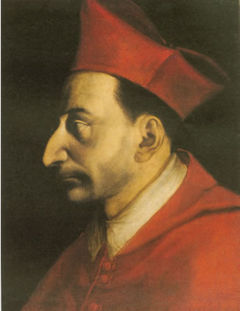St Charles Borromeo

Everything was against Charles Borromeo becoming a saint. He came from one of Italy’s great families and lived in an age when clerics collected Church posts and offices without residing or doing the work but only to enjoy the revenues. At the age of twelve he was given an Abbacy. Then shortly afterwards his uncle was elected Pope (Pius IV). New Popes often made their relatives Cardinals and so, at the age of twenty-two, Charles found himself as the powerful and wealthy Cardinal Nephew.
But this didn’t go to the young man’s head. He lived in an age, also, of Church reform. When he became Archbishop of Milan (aged twenty-five) he applied the decrees of the Council of Trent to his new diocese with great zeal. He called a diocesan synod, founded seminaries, encouraged ‘Sunday Schools’ in the parishes and established a society of priests, called the ‘Oblates.’
His attempts at reforming the Church led to much opposition and even several assassination attempts. On one occasion, while he was at Vespers, a member of a religious Order called the Humiliati came in with a musket and shot St Charles. Luckily he was only injured lightly in the leg.
St Charles has several links with England. Many English Catholics had fled to the continent because of the persecutions under Elizabeth I. An English College was founded at Rome to train priests and St Charles was visited by St Edmund Campion and St Ralph Sherwin as they made their way back home to face eventual martyrdom. Another exile, the Welshman Owen Lewis, became his vicar-general. St Charles also had great devotion to a picture in his possession of St John Fisher, whom he regarded as a model bishop.
St Charles was full of pastoral charity – happy to sit by the roadside to teach a poor man the Lord’s Prayer and to tend the dying during a plague epidemic. St Charles is a great example to us all. Despite his privileged background he was focussed not on the temptations of the world but simply on doing his duty and following the will of God. ‘Whoever would go forward in God’s service,’ he said, ‘must begin his life anew each day, must keep himself as much as possible in the presence of God, and in all his actions must have one object, God’s glory.’



0 Comments:
Post a Comment
<< Home